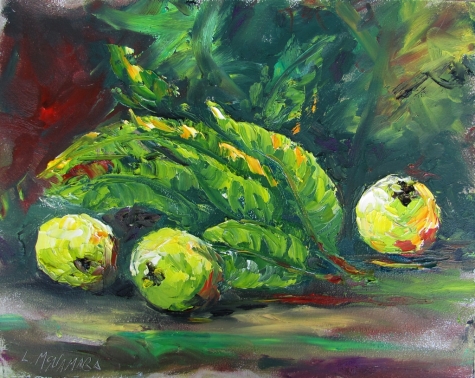
“Golden Guavas” by Lori McNamara, oil on masonite
–For Bertha Pappenheim (1859–1936)
What did you uncover in that doctor—
the man who published your secrets with Freud—
as you reclined there on his sofa, throwing pillows
at twenty-one, pouting like a pretty thing
in your stiff corsets and lace?
He must have seemed relief
when he hypnotized you,
ragged memories made smooth
as he unlocked your mute tongue—
Profoundly melancholy fantasies,
the doctor said, characterized by poetic beauty.
The talking cure, you named it
when you felt free to associate,
to speak of your ill father
and old memories, his mouth quieting yours,
his fingers holding your child body rigid.
Is this why you envisioned yourself pregnant
with the doctor’s child,
swooning with morning nausea,
your empty belly grown round, firm like fruit?
At least that’s how legend goes—though who writes those?
He said he hoped you’d die to end your suffering
when he sentenced you to the sanitarium,
your story—even your name—changing.
Anna O, named by men who labeled you hysteric.
They did not write of you beyond their discovery,
your diagnosis, the empty promise of your catharsis.
Your noble quiet, the delicacy with which you worked,
each careful accomplishment credited to their care, their cure.
Speak now, Bertha—thrash and dance, leave mythmakers
wide-eyed at all you have done in spite of them.
Sarah Fawn Montgomery holds an MFA in creative nonfiction from California State University-Fresno and a PhD in creative writing from the University of Nebraska-Lincoln, where she teaches and works as Prairie Schooner’s Nonfiction Assistant Editor. She is the author of The Astronaut Checks His Watch (Finishing Line Press). Her work has been listed as notable several times in Best American Essays, and her poetry and prose have appeared in various magazines including Confrontation, Crab Orchard Review, DIAGRAM, Fugue, Georgetown Review, The Los Angeles Review, Natural Bridge, Nimrod, North Dakota Quarterly, The Pinch, Puerto del Sol, Southeast Review, Terrain, Zone 3 and others.
Read an interview with Sarah Fawn here.

Lovely poem. But I don’t understand the grammar in the line “He must have seemed relief”?